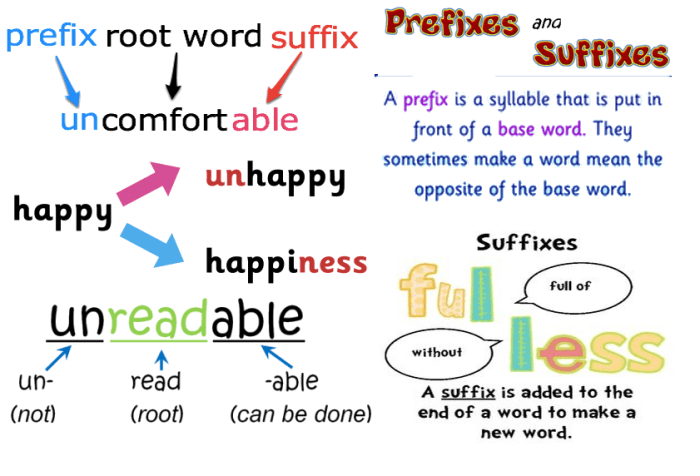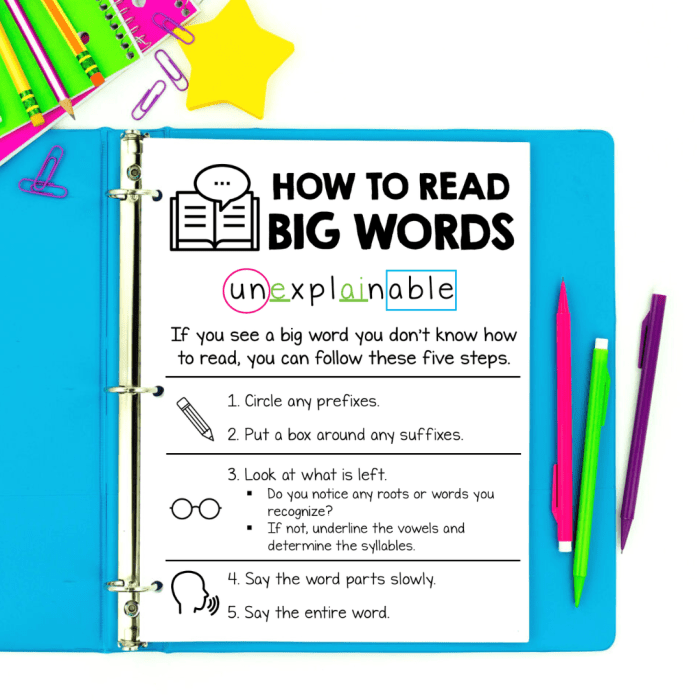Multisyllabic words with prefixes and suffixes stand as pillars of language, expanding vocabulary and enriching its tapestry. By understanding their formation, meaning, and impact, we unlock a deeper appreciation for the intricacies of communication.
Delving into the world of multisyllabic words, we will explore the diverse types of prefixes and suffixes, their functions, and the processes involved in word formation. We will uncover how these elements shape meaning, enhance precision, and contribute to the historical evolution of language.
Multisyllabic Words with Prefixes and Suffixes
Multisyllabic words are words that contain more than one syllable. Prefixes are added to the beginning of words, and suffixes are added to the end of words. Prefixes and suffixes can change the meaning of words, and they can also be used to create new words.
Types of Prefixes and Suffixes: Multisyllabic Words With Prefixes And Suffixes

There are many different types of prefixes and suffixes. Some of the most common prefixes include:
- un- (not)
- re- (again)
- dis- (not)
- pre- (before)
- post- (after)
Some of the most common suffixes include:
- -ment (result of an action)
- -tion (action or process)
- -er (person who does something)
- -ness (state or quality)
- -ive (having or causing)
Formation and Meaning
Multisyllabic words are formed by adding prefixes and suffixes to root words. The root word is the base word, and the prefix or suffix changes the meaning of the word. For example, the word “unhappy” is formed by adding the prefix “un-” to the root word “happy.”
The prefix “un-” means “not,” so the word “unhappy” means “not happy.”
Impact on Vocabulary and Language
Multisyllabic words with prefixes and suffixes play an important role in expanding vocabulary. They allow us to create new words that have specific meanings. For example, the word “prejudice” is formed by adding the prefix “pre-” to the root word “judice.”
The prefix “pre-” means “before,” so the word “prejudice” means “a judgment made before having all the facts.”
Usage in Writing and Communication

Multisyllabic words with prefixes and suffixes can be used to make writing and communication more precise and clear. They can also be used to create a more formal tone. For example, the word “unprecedented” is a more formal way of saying “never before seen.”
Using multisyllabic words with prefixes and suffixes can help to make your writing more sophisticated and impressive.
Historical Evolution
Multisyllabic words with prefixes and suffixes have been used in the English language for centuries. They have evolved over time, and new prefixes and suffixes have been added to the language. The use of multisyllabic words with prefixes and suffixes has also changed over time.
In the past, these words were more common in formal writing. However, today, they are used in all types of writing, including informal writing.
Popular Questions
What is the role of prefixes in multisyllabic words?
Prefixes modify the meaning of root words, creating new words with distinct meanings. For example, the prefix “un-” in “unhappy” negates the meaning of “happy.”
How do suffixes impact word formation?
Suffixes change the part of speech of a word, transforming nouns into verbs, adjectives into nouns, and so on. For instance, the suffix “-tion” in “education” converts the noun “educate” into a noun.
Why are multisyllabic words important for vocabulary expansion?
Multisyllabic words often carry more specific and nuanced meanings than their shorter counterparts, allowing us to express complex ideas with precision and clarity.
